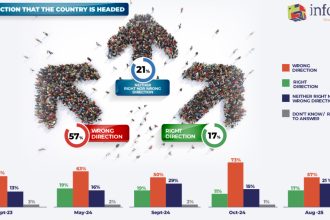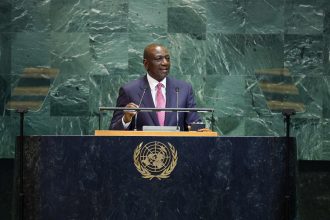Kenya has issued a strong warning to human traffickers, signaling a renewed commitment to tackling the pervasive issue that has long affected vulnerable populations, particularly migrant workers.
Speaking at Jomo Kenyatta International Airport on Saturday after receiving 31 Kenyans rescued from Myanmar scam camps, Diaspora Affairs PS, Roseline Njogu declared that no member of the trafficking syndicates would be spared.
“We are coming for you. There is nowhere to hide,” the PS asserted.
She emphasized that a multi-agency approach is being implemented to combat the menace, which has victimized hundreds of Kenyan youth.
The PS underscored the government’s commitment to dismantling these networks and holding rogue agents accountable for exploiting unsuspecting Kenyans and causing harm to families.
The announcement comes as part of broader efforts to protect Kenyans both at home and abroad from exploitation.
Read: Weekly Recap: Kenya-China debt, JB’s ‘exposé’ and diplomatic misconduct
According to a January 2025 report from the U.S. State Department, Kenya has made strides in combating trafficking but continues to face significant hurdles.
The report highlighted that corruption among police and court officials has historically undermined enforcement efforts, with some officers accepting bribes to tip off traffickers about impending operations, particularly along the coast.
Additionally, perpetrators have evaded justice by bribing magistrates or intimidating witnesses, further complicating prosecutions.
The National Employment Authority, which plays a key role in regulating employment and protecting Kenyan migrant workers, has been at the forefront of anti-trafficking initiatives.
The agency requires recruitment agencies to contribute to a security fund designed to cover repatriation costs for migrant workers, including potential trafficking victims, who find themselves in exploitative situations abroad.
However, non-governmental organizations (NGOs) have criticised the fund’s effectiveness, noting that the government’s lengthy complaint resolution process often forces workers to seek alternative assistance.
Kenya’s anti-trafficking efforts extend beyond its borders, particularly in response to the challenges faced by Kenyan migrant workers in the Middle East.
In recent years, the government has taken steps to address the plight of workers in Saudi Arabia, a major destination for Kenyan labor migrants.
The U.S. State Department report noted that high-level Kenyan officials visited Saudi Arabia during the reporting period to monitor working conditions and engage with Saudi authorities on labor issues, including human trafficking.
As a result of these engagements, the Kenyan government approved the establishment of a shelter in Saudi Arabia for vulnerable migrant workers, including potential trafficking victims. Although a space for the shelter has been identified, it was not yet operational as of early 2025.
The government has also implemented measures to better prepare migrant workers before they leave the country.
The NEA mandates that all migrant workers attend a pre-departure training course, which includes education on human trafficking, migrant rights, and specific homecare management training for domestic workers.
These efforts aim to empower workers with the knowledge to recognize and avoid exploitative situations.
The 2023 Trafficking in Persons Report for Saudi Arabia, published by the U.S. State Department, revealed the scale of the issue in the Kingdom, identifying 1,454 potential trafficking victims, including Kenyans, with 942 cases involving forced labor.
The report also noted that while Saudi authorities offered support to some victims, such as the option to remain in the country during judicial proceedings or receive an immediate exit visa, many others did not receive adequate services, highlighting gaps in victim care.












